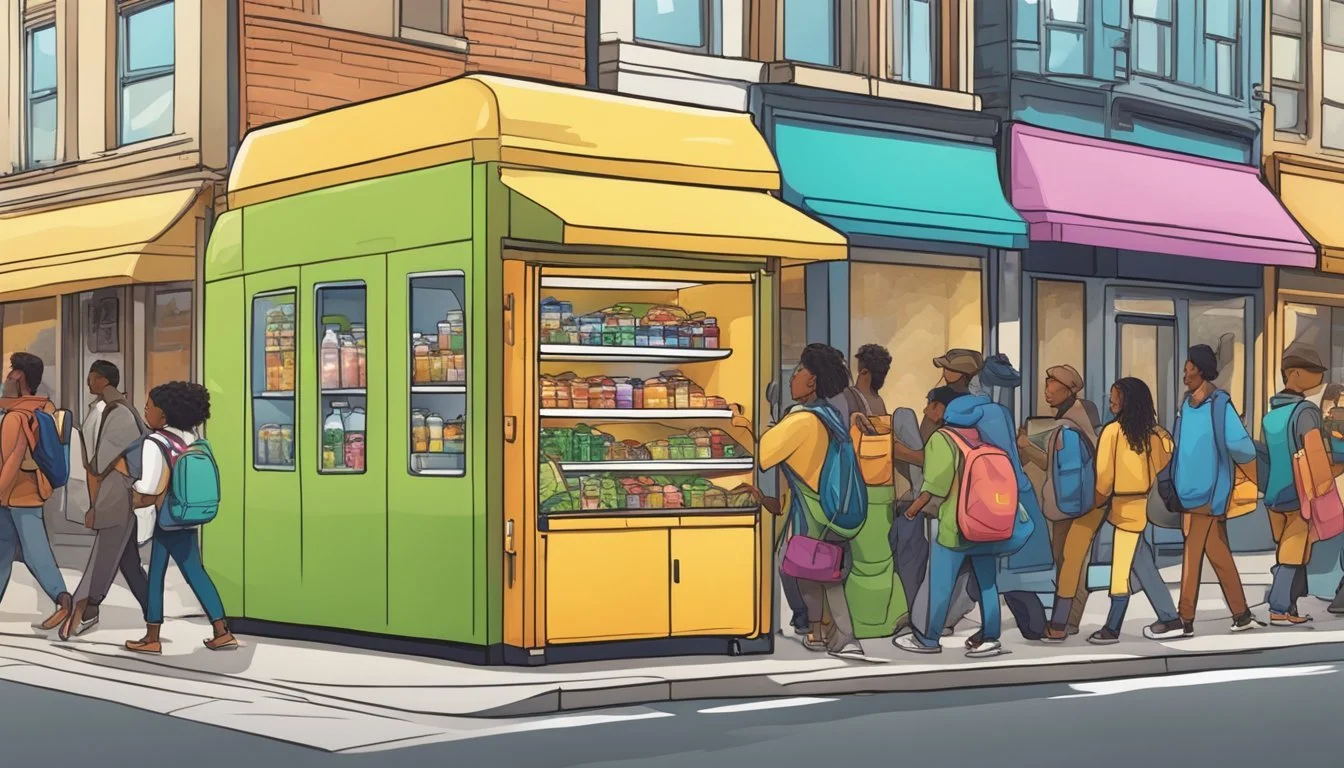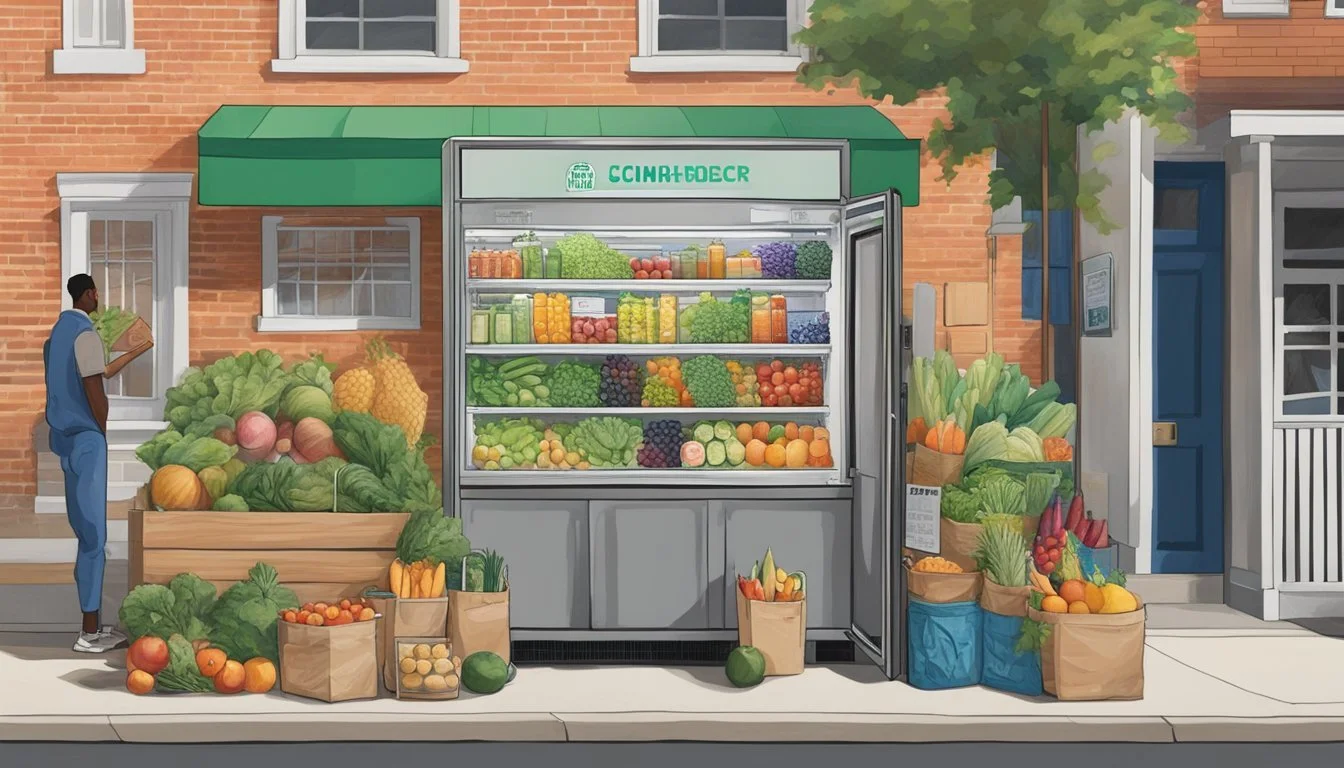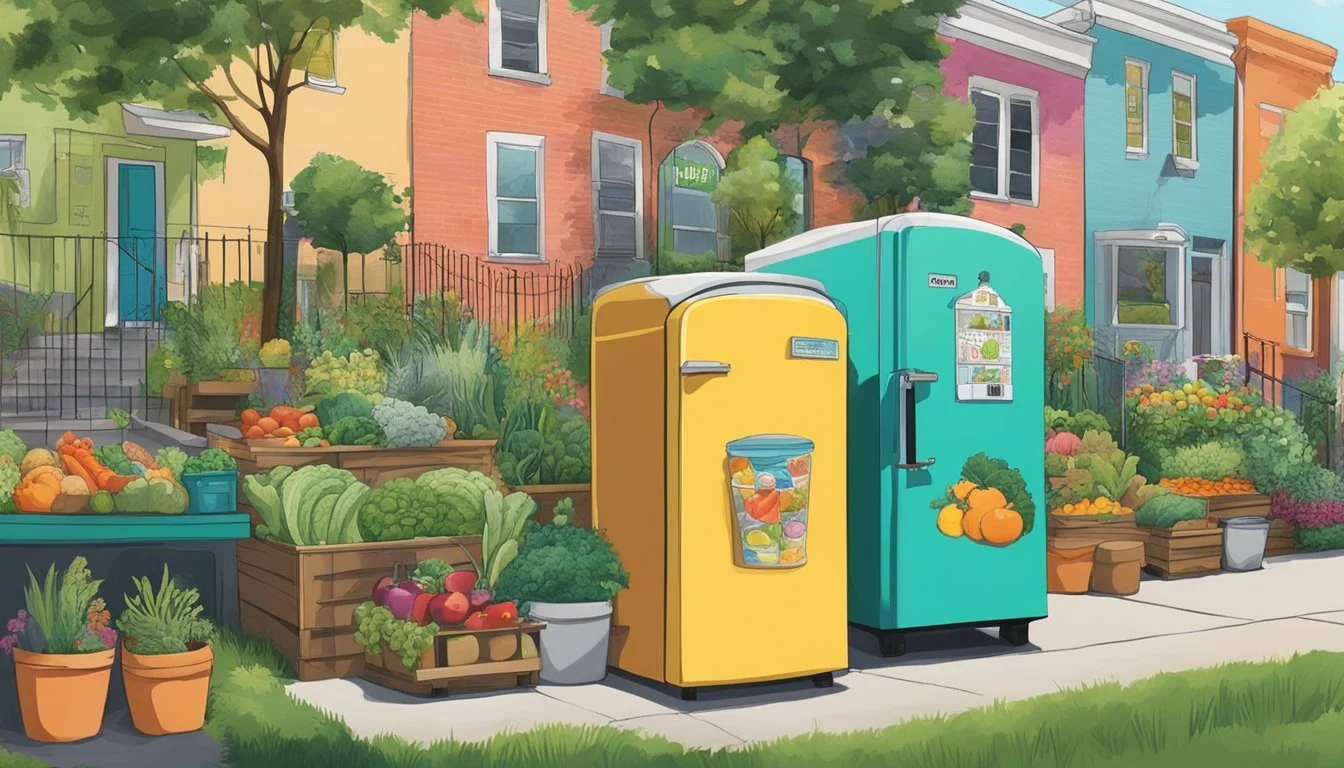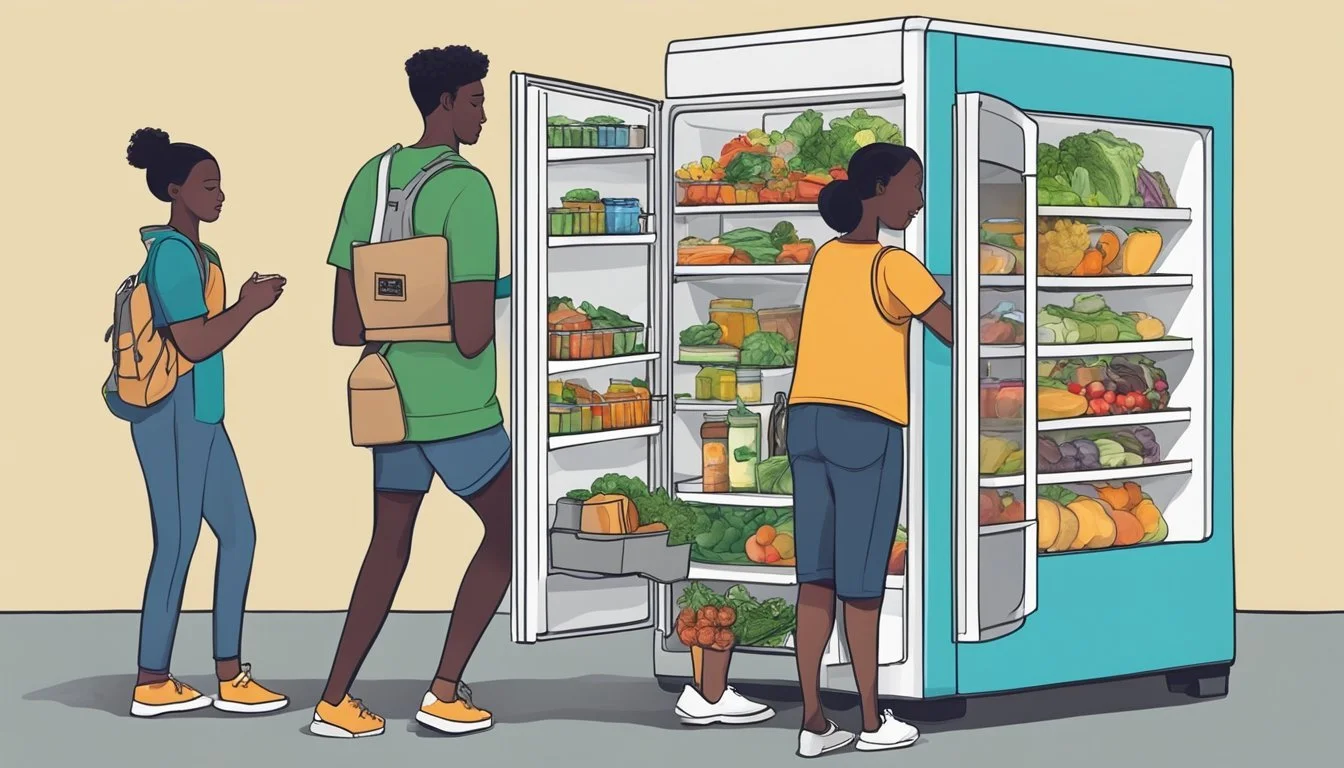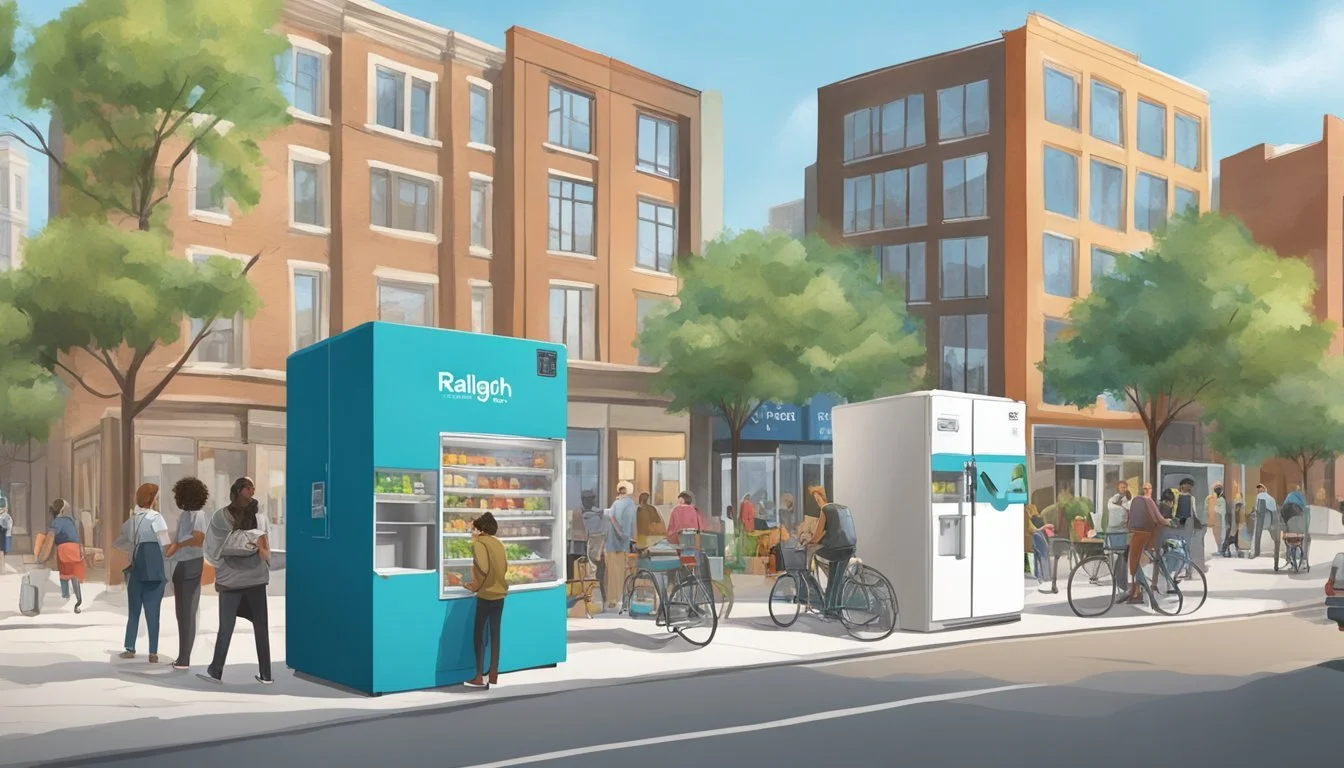Raleigh, NC Community Fridge
Nourishing the Neighborhood Together
In the heart of Raleigh, North Carolina, a movement aimed at reducing food waste and addressing food insecurity has taken shape through the establishment of community fridges. These fridges, strategically placed across the city, serve as a beacon of communal support, empowering residents to both share and access food at no cost. The simple yet effective concept encourages individuals to leave good food that would otherwise be discarded, thereby making it available to those who need it.
Raleigh's community fridge initiative reflects a broader trend of grassroots efforts to foster food sharing while nurturing a sense of community. It's not just about offering free meals or perishables; it’s a statement about taking collective action towards a sustainable future. Organizations and local heroes come together to support these fridges, ensuring they are well-maintained and stocked, which is a testament to the city's commitment to community and mutual aid.
The fridges can be found in various neighborhoods, becoming a part of the local landscape and daily life. They operate on the principle of take what you need, leave what you can, embodying a spirit of generosity that is palpable in Raleigh's streets. This system not only combats hunger but also promotes an environmentally-friendly practice by salvaging food that is still edible and nutritious, diverting it from landfills to tables where it fills a critical need.
Origin and Purpose
The Raleigh, NC Community Fridge is a grassroots response to a global issue, designed to tackle food insecurity at a local level. Through the sharing of resources, it aims to create a more sustainable community.
Rise of Community Fridges
Community fridges emerged as a direct community effort to reduce food waste and provide accessible food sources. In Raleigh, local residents and organizations recognized the potential of a communal fridge to foster a sense of sharing and support among residents. These refrigerators are often placed in accessible locations and are stocked with food donated by businesses, individuals, and farmers. The goal is to make food available to anyone who needs it, without the barriers that traditional food aid programs might have.
Addressing Food Insecurity
Food insecurity has been a persistent issue, which the coronavirus pandemic only exacerbated, leading to many facing economic hardships and limited access to nutritious food. The Raleigh Community Fridge serves as a tangible solution in the community's fight against hunger. By allowing people to take what they need and give what they can, the fridge operates on a principle of mutual aid and trust. It not only makes food more accessible but also addresses the stigma sometimes associated with seeking help by providing a judgement-free zone for food sharing.
Community Fridge Locations
In Raleigh, NC, the establishment of community fridges serves as a proactive effort to address food insecurity while fostering a sense of sharing and community support. These refrigerators are strategically placed in accessible areas for residents.
Identifying Strategic Locations
Community fridge organizers in Raleigh prioritize locations based on high visibility and ease of access. These sites include community centers, food co-ops, and local businesses willing to host and provide electricity for the appliances. Each spot is chosen to maximize the benefit for residents and facilitate the distribution of free, healthy food.
Accessibility for Neighborhoods
Accessible community fridges play a vital role in supporting various neighborhoods across Raleigh. To ensure equitable access, locations are distributed throughout the city, considering factors like density, need, and public transportation routes. This approach guarantees that the benefits of community fridges are within reach for as many people as possible, regardless of where they live in Raleigh.
Supporting the Community
The Raleigh, NC Community Fridge initiative thrives on the cooperative efforts between local businesses and dedicated volunteers. Every contribution and act of service collectively supports the well-being of the community.
Involvement of Local Businesses
Local businesses play a crucial role in the sustainability of Raleigh's Community Fridge initiative. They often provide donations of perishable food items, enabling the fridge to serve a constant supply of fresh options to individuals in need. Businesses such as grocery stores, farms, and bakeries collaborate with the organizers, upholding a commitment to reduce waste and feed the hungry. This synergy not only nurtures the local community but also fosters a spirit of philanthropy within the business sector.
Community Engagement and Volunteers
Behind the success of the Community Fridge are the tireless efforts of volunteers. These individuals dedicate their time and energy to tasks such as maintaining the cleanliness of the fridge, monitoring the stock for expired items, and organizing food drives. Community engagement is at the heart of the project, with people from all backgrounds uniting under the goal of mitigating food insecurity. Volunteers are vital, offering more than just labor; they provide a human connection and embody the compassion of the Raleigh community.
Usage Guidelines
The Raleigh, NC Community Fridge initiative empowers residents by offering a resource for food sharing, focusing on free food and ready-to-eat items. Strict adherence to the guidelines ensures the project's success and maintains health and safety standards.
Utilizing the Fridge Responsibly
Residents should approach the community fridge with respect and mindfulness. The fridge is meant for everyone, and patrons should only take what they need to ensure that others can also benefit. Food safety is paramount, so individuals are expected to check expiration dates and inspect food for spoilage before consumption. Those utilizing the fridge are also responsible for keeping the space tidy and should report any issues to the designated contact immediately.
Only take what you need: Moderate personal use helps to keep the fridge stocked for others.
Inspect food carefully: Avoid taking home spoiled or expired items.
Donation Recommendations
They encourage donations, but they must meet specific requirements to ensure the safety and utility of the food provided. Donors should focus on pre-packaged, non-perishable items, as well as fresh produce and ready-to-eat foods that do not require additional preparation. Homemade meals or opened packages are not accepted due to safety regulations.
Ideal items to donate include:
Sealed, non-perishable goods (canned vegetables, pasta, rice)
Fresh fruits and vegetables, properly washed and packaged
Unopened, commercially packaged ready-to-eat foods
Donations Do's Don'ts Fresh Produce Wash and package Donate spoiled items Packaged Goods Ensure seals are intact Donate anything past expiration Ready-to-Eat Only commercially packaged Provide home-cooked meals
By following these guidelines, the Raleigh Community Fridge operates effectively, offering a dependable source of nourishment for those in need.
Maintenance and Sustainability
The success of Raleigh's community fridge initiative hinges on diligent maintenance and sustainable operation. A sustained effort ensures both food safety and the longevity of the refrigerator's service to the community.
Regular Cleaning Schedule
Volunteers are instrumental in maintaining a regular cleaning schedule. They ensure the community fridge is sanitized and that perishables are safe for consumption. Cleaning protocols typically include:
Daily: Wiping surfaces and handling spills.
Weekly: A thorough cleaning, including the removal and disposal of expired items.
Monthly: Inspection and cleaning of the refrigeration coils and seals.
All these steps prevent the build-up of bacteria and ensure the fridge remains a hygienic resource for the community.
Ensuring Continuous Operation
Continuous operation of a community fridge requires a reliable network of support. Volunteers are scheduled to:
Monitor inventory levels for both excess and deficiencies.
Perform regular checks on the refrigerator's functionality.
A structure is in place for prompt repairs should the fridge show signs of wear or malfunction. Sustainability factors in optimized energy use and pursuing the use of energy-efficient refrigerator models, where feasible.
Impact on Food Waste
Raleigh's Community Fridge, known locally as the "Freedge," has taken a bold step towards addressing food waste. This fridge allows residents to leave surplus food, which is then available for those who need it. This initiative not only supports community members facing food insecurity but also reduces the amount of edible food being thrown away.
The Freedge operates on the principle of taking what you need and leaving what you don't. This simple yet effective practice has seen the following impacts:
Decrease in Food Waste: By providing a direct channel for surplus food, the Freedge ensures that less food ends up in landfills, where it would contribute to greenhouse gas emissions.
Community Engagement: Individuals and businesses are encouraged to participate, fostering a sense of community around a shared goal of waste reduction.
Key Contributor Percentage of Food Waste Households 37% Restaurants < Household Percentage Grocery Stores < Household Percentage
By targeting the largest group of food waste contributors—households—the Freedge directly addresses the main source of edible food waste. The initiative aligns with North Carolina's broader efforts to combat food waste, complementing state-wide programs to lessen environmental impact.
Through conscious consumption and redistribution, the Freedge underscores the value of each food item. It sends a clear message: food is a precious resource that can be managed more efficiently. Its presence in Raleigh represents a beacon of responsible consumption and waste management.
Outreach and Promotion
Effective outreach and promotion are essential for the success and visibility of Raleigh's Community Fridge initiatives. These efforts ensure that community members are both aware of and can contribute to this valuable resource.
Leveraging Social Media
Instagram has become a powerful tool for spreading the word about community fridges. The visual platform allows for sharing photos and stories of the fridges in action, which can include highlights of food donations or community members benefiting from the service. Specifically, Raleigh's Community Fridge organizers can create a dedicated Instagram account to showcase the daily contributions and success stories. This humanizes their efforts and encourages local involvement.
Instagram Content Strategy
Posts: Images of stocked fridges, volunteers, and thank-you notes from fridge users
Stories: Behind-the-scenes looks, donation drives, and updates
Hashtags: Custom tags like #RaleighCommunityFridge or #FeedRaleigh to increase visibility
Community Event Participation
Participation in local events provides a tangible presence for community fridges within Raleigh. Whether it's a booth at a farmers' market or involvement in a city festival, being part of such events allows the organizers to engage directly with the public. Flyers, informational brochures, and interactive sessions can be tools they use to educate attendees about how to access or donate to the fridges.
Event Engagement Activities
Information Booth: Displaying a map of fridge locations and how to get involved
Interactive Sessions: Demonstrations on how to prepare food donations or guided visits to a nearby community fridge
Expansion of the Community Fridge Network
The Raleigh, NC community fridge initiative is part of a growing movement that is bringing together local groups, businesses, and individuals to address food insecurity through communal refrigerators.
Collaboration with National Networks
Community fridge networks have proliferated across the United States, with organizations such as 901 Community Fridges actively expanding by establishing new fridge locations in various neighborhoods. They seek local hosts and support from businesses and community organizations to sustain and grow. This model is consistent with national trends, where local community groups or volunteers run fridges in public spaces, like community centers or schools. The success of these networks can often be attributed to strategic partnerships and collaborations that extend regionally and nationally.
Starting Your Own Community Fridge
For those interested in starting a community fridge in Raleigh, it is vital to engage with both the local community and national support structures to ensure a successful launch. Best practices suggest:
Securing a public location with good visibility and access
Gaining community buy-in through meetings and partnerships
Establishing guidelines that ensure the fridge is well maintained
Connecting with a national support network, such as the UK-based initiative that has seen their network grow to over 450 fridges, to share resources and knowledge
The process is grounded in community involvement and requires thorough planning and ongoing support to thrive.

